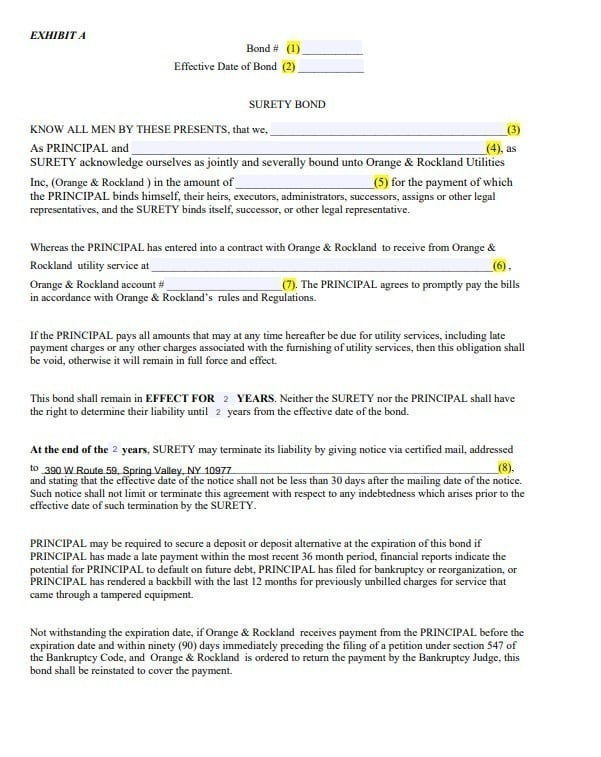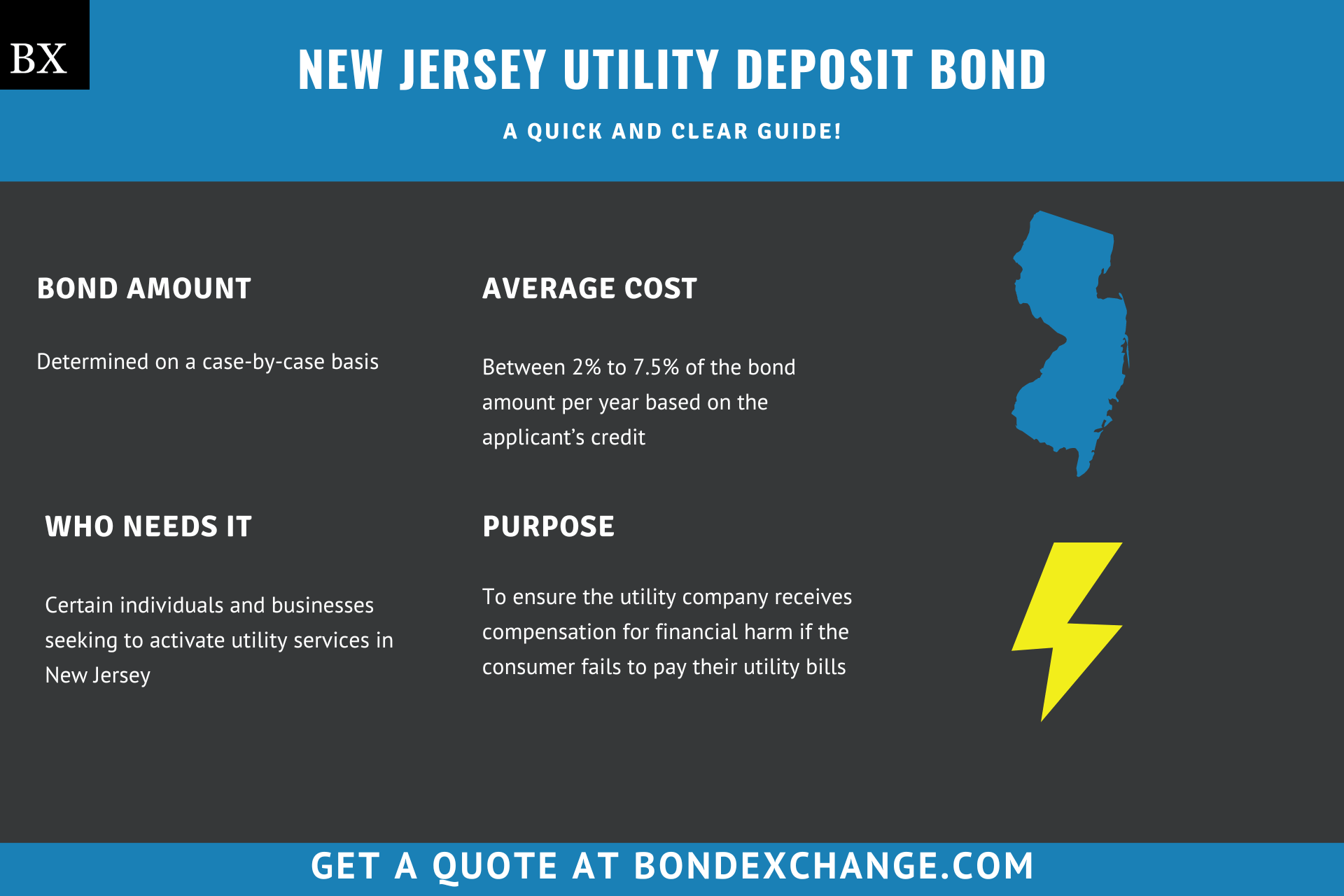New Jersey Utility Deposit Bond: A Comprehensive Guide
This guide provides information for insurance agents to help their customers obtain a New Jersey Utility Deposit bond.
At a Glance:
- Average Cost: Between 2% to 7.5% of the bond amount per year based on the applicant’s credit
- Bond Amount: Equal to two times the location’s average monthly bill (more on this later)
- Who Needs it: Individuals and businesses that do not want to pay a cash deposit before receiving utility services
- Purpose: To ensure the utility company receives compensation for financial harm if the customer fails to pay their utility bills
- Who Requires Utility Deposit Bonds in New Jersey: Orange and Rockland Utilities

Background
New Jersey Administrative Code 14:3-3.4 grants utility companies the authority to require consumers to pay a security deposit before initiating service. Security deposits help ensure utility companies do not suffer financial harm if customers do not pay their bills. In lieu of depositing cash, Orange and Rockland Utilities allows customers to purchase and maintain a surety bond.
What is the Purpose of the New Jersey Utility Deposit Bond?
Orange and Rockland Utilities requires customers not wishing to deposit cash to purchase a surety bond as a prerequisite to obtaining utility services. The bond ensures that the company will receive compensation for financial harm if the customer fails to comply with the provisions laid out in the bond form. Specifically, the bond protects the utility company if the customer does not pay their monthly bills. In short, the bond is a type of insurance that protects utility companies if the customer fails to remit all required payments.
How Can an Insurance Agent Obtain a New Jersey Utility Deposit Surety Bond?
BondExchange makes obtaining a New Jersey Utility Deposit Surety Bond easy. Simply login to your account and use our keyword search to find the “utility” bond in our database. Don’t have a login? Gain access now and let us help you satisfy your customers’ needs. Our friendly underwriting staff is available by phone (800) 438-1162, email, or chat from 7:30 AM to 7:00 PM EST to assist you.
At BondExchange, our 40 years of experience, leading technology, and access to markets ensures that we have the knowledge and resources to provide your clients with fast and friendly service whether obtaining quotes or issuing bonds.
Not an agent? Then let us pair you with one!

Click the above image to find a BX Agent near you
How is the Bond Amount Determined?
New Jersey Administrative Code 14:3-3.4 states that the bond amount must equal twice the location’s average monthly bill during the previous 12 months. If the location is a new construction, Orange and Rockland Utilities will estimate the average monthly bill based on that of a similar location.
Is a Credit Check Required for the New Jersey Utility Deposit Bond?
Surety companies will run a credit check on the applicant to determine eligibility and pricing for the New Jersey Utility Deposit bond. Applicants with excellent credit and work experience can expect to receive the best rates. Applicants with poor credit may be declined by some surety companies or pay higher rates. The credit check is a “soft hit”, meaning that the credit check will not affect the applicant’s credit.
How Much Does the New Jersey Utility Deposit Bond Cost?
The New Jersey Utility Deposit bond can cost anywhere between 2% to 7.5% of the bond amount per year. Insurance companies determine the rate based on a number of factors, including your customer’s credit score and experience. The chart below offers a quick reference for the approximate bond cost on a $10,000 bond requirement.
$10,000 Utility Deposit Bond Cost
| Credit Score* | Bond Cost (1 year) | Bond Cost (1 month) |
|---|---|---|
| 800+ | $200 | $20 |
| 650 – 799 | $500 | $50 |
| 600 – 649 | $750 | $75 |
*The credit score ranges do not include other factors that may result in a change to the annual premium offered to your customers, including but not limited to, years of experience and underlying credit factors contained within the business owner’s credit report.
BondExchange now offers monthly pay-as-you-go subscriptions for surety bonds. Your customers are able to purchase their bonds on a monthly basis and cancel them anytime. Learn more here.
Who May Purchase a New Jersey Utility Deposit Bond?
Orange and Rockland Utilities allows both residential and non-residential customers to purchase a surety bond in lieu of depositing cash. The bond must remain in effect for at least 2 years.
How do Orange and Rockland Utilities Customers Obtain Utility Services?
Customers of Orange and Rockland Utilities must navigate several steps to obtain utility services, as outlined below.
Step 1 – Submit a Start Service Request
To start service with Orange and Rockland Utilities, customers must complete a start service request located here.
Step 2 – Purchase a Surety Bond or Deposit Cash
If your customer is required to pay a security deposit, they must either purchase a surety bond (limits outlined above), deposit cash, or enroll in the company’s automatic payment plan.
How Do New Jersey Utility Customers File Their Bonds?
Utility customers in New Jersey should submit their completed bond forms, including the power of attorney, to their nearest Liberty Utilities office (confirm this with the customer service rep when initiating service).
The surety bond requires signatures, including witness signatures, from the surety company that issues the bond and the customer. The surety company will include the following information on the bond form:
- Name of the entity/individual(s) buying the bond
- Surety company’s name and state of incorporation
- Entity requiring the bond (Liberty Utilities)
- Bond amount
- Date the bond is signed
What Can Utility Customers in New Jersey Do to Avoid Claims Against Their Bonds?
To avoid claims on their bonds, utility customers in New Jersey must ensure they pay their utility bills on time and in full.
What Other Insurance Products Can Agents Offer Utility Customers in New Jersey?
New Jersey only requires businesses to be bonded. As such, agents can offer their customers general business and liability insurance in addition to the utility deposit bond. Bonds are our only business at BondExchange, so we do not issue liability insurance, but our agents often utilize brokers for this specific line of business. A list of brokers in this space can be found here.
Should Your Customer Purchase a Surety Bond or Deposit Cash?
Surety bonds are generally considered the better option for businesses, as they free up working capital that would otherwise have to be deposited with the utility company. For more information on whether your customer should purchase a bond or deposit cash, check out our Surety Bonds vs. Letters of Credit article here.

